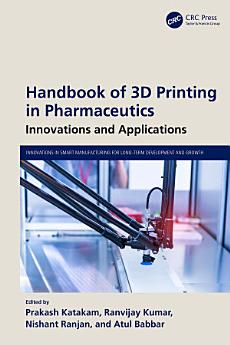Handbook of 3D Printing in Pharmaceutics: Innovations and Applications
About this ebook
Handbook of 3D Printing in Pharmaceutics: Innovations and Applications provides a detailed and in-depth technical discussion on the various additive manufacturing processes for the development of pharmaceutical products with experimental justification. It details the characterization, optimization, and numerical modeling of the processes involved and outlines the industrial implications of the resulting products as well as offering solutions for patient- tailored drugs processed by additive manufacturing. The handbook goes on to focus on the various post- processing technologies available to fortify the mechanical, chemical, biological, geometrical, and other characteristics of additively manufactured components and also discusses future directions and possible research gaps that need to be filled.
The buyers of this cutting-edge handbook will learn the complete information and methodology for manufacturing drug delivery systems and customized medicine for biomedical applications. It is an ideal read for undergraduates, graduates, and postgraduate research scholars. Industrial and academic professionals working and studying industrial, manufacturing, and production engineering, along with those studying mechanical engineering, pharmaceutical sciences, material science, chemical engineering, biomedical engineering, automobile/aerospace engineering, and other relevant domains will want this handbook at their fingertips.
About the author
Prakash Katakam is a pharmaceutical scientist working as professor and principal at Indira College of Pharmacy, Nanded, India. He has more than 27 years of professional experience as a teacher and researcher. He published over 150 research articles in indexed journals and guided 14 PhD students. His research areas are 3D printing for personalized drug delivery, pulmonary delivery of vaccines, micro/ nanoparticles, phytoformulations and drug discovery. He is the founder of a research laboratory on 3D printing, RxPrints Lab, 3DFying Inc., Hyderabad, India and Awarded for his invention, “Indigenous 3D Printer Customized Medicine and Pharmaceutics of the Year 2023”, by IIT Bombay, India. His major research focus is on identifying applications of various polymers for 3D printing for patient- specific dosage forms. He has been co- principal investigator for a sponsored research project of National Tea Research Foundation, India. Recently he contributed a publication on “Navigating the Challenges of 3D Printing Personalized Medicine in Space Explorations: A Comprehensive Review” in Critical Reviews in Therapeutic Drug Carrier Systems Journal and a book chapter “Recent Advancements of Additive Manufacturing for Patient- Specific Drug Delivery” in the book, “Additive Manufacturing Processes in Biomedical Engineering”, published by CRC Press (Taylor & Francis Group). Dr. Katakam also published a highly cited review article, “Top- Down and Bottom- Up Approaches in 3D Printing Technologies for Drug Delivery Challenges” in the journal Critical Reviews in Therapeutic Drug Carrier Systems.
Ranvijay Kumar is an assistant professor at the University Centre for Research and Development, Chandigarh University. He received a PhD in Mechanical Engineering from Punjabi University, Patiala. Additive manufacturing, shape memory polymers, smart materials, friction- based welding techniques, advanced materials processing, polymer matrix composite preparations, reinforced polymer composites for 3D printing, plastic solid waste management, thermosetting recycling, and destructive testing of materials are Dr. Kumar’s expertise. Dr. Kumar has won the prestigious CII MILCA award in 2020. He has co- authored more than 43 research papers in science citation indexed journals, and 38 book chapters, and has presented 20 research papers at various national/ international- level conferences. He has contributed extensively to the additive manufacturing literature with publications appearing in Journal of Manufacturing Processes, Composite Part: B, Rapid Prototyping Journal, Journal of Thermoplastic Composite Materials, Measurement, Proceedings of the Institution of Mechanical Engineers, Part C (iMeche Part C), Proceedings of the Institution of Mechanical Engineers, Part H: Journal of Engineering in Medicine, Journal of Thermoplastic Composite Materials, Materials Research Express, Proceedings of the National Academy of Sciences, India Section A: Physical Sciences, Journal of Central South University, Journal of the Brazilian Society of Mechanical Sciences and Engineering, Composite Structures, and CIRP Journal of Manufacturing Science and Technology. He is also the editor of the book “Additive Manufacturing for Plastic Recycling: Efforts in Boosting A Circular Economy” published by CRC Press (Taylor & Francis Group).
Atul Babbar
Nishant Ranjan is working as Assistant Professor at University Centre for Research and Development at Chandigarh University. Fused deposition-modeling, extrusion, thermoplastic polymers, the composition of thermoplastic polymers, natural and synthetic biopolymers, scaffolds printing, 3D printing technology, thermal, mechanical, morphological, and chemical properties of thermoplastic polymers, biocompatible and biodegradable fillers, reinforcement of materials are his main focused areas. He has co-authored more than 36 research papers in science citation index journals, 38 book chapters, and 2 books and presented more than 12 research papers at various national-level conferences.







